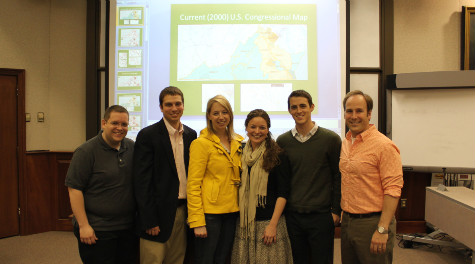W&M Teams Win Top Prizes in Virginia Redistricting Competition
Graduate and undergraduate teams from the College of William & Mary won top prizes in three categories in the first Virginia Redistricting Competition. Prizes in the competition were announced March 22 in Richmond. Teams from the University of Virginia, George Mason University and the University of Richmond took other first place prizes in the competition's six categories. Winners were chosen from 15 teams participating in the contest to design alternatives to gerrymandered political districts in Virginia.
The competition included district maps for the U.S. Congress, the Virginia State Senate and the Virginia House of Delegates in two divisions, one that took candidate competitiveness into account and one that did not. The graduate team, from the William & Mary Law School, won first place honors in the Governor/Commission Division for the U.S. Congressional Map category. The government department's undergraduate team took first place in the same division in the State Senate category. The Law School team also won second place in the Competitive Division for State Senate Maps. The awards included cash prizes. The Law Team brought home $1,750 for their wins, the undergraduate team - $1,500. The William & Mary teams were up against students from fifteen other Virginia colleges and universities.
"I am really proud of the William & Mary Law team," said Rebecca Green, coordinator of the Law School's Election Law Program and faculty advisor for the law team. "It was an incredibly rewarding experience to teach about redistricting last semester and then engage in the redistricting process this semester."
The competition, sponsored by the Wason Center for Public Policy at Christopher Newport University and the Public Mapping Project, was designed to educate students and the public about the process of redistricting, according to the competition's Web site.
"I'm hopeful that this competition will have real impact on the redistricting process in Virginia. For the first time, Virginia law makers will have to answer to credible alternatives presented through this competition," said Green.
Judges noted that the William & Mary Law Team's narrative writing in the project "set the standard" for the competition, she added.
The Law Team included students Brian Cannon J.D. '11, Alexander Grout J.D. '12, John Holden J.D. '12, Meredith McCoy J.D '12, Rebekah Miller J.D. '12, Nicholas Mueller J.D. '12, Peter Newman J.D. '13, Samuel Robinson J.D. '11, and Brian Rothenberg J.D. '13.
The undergraduate team, led by faculty advisors Professors John McGlennon and Ronald Rapoport of the Government Department, included Alexander Bramsen '12, Devin Braun '12, Eric Ames, '12, Thomas Chappell '11, Dimelza Gonzales-Flores '12, Russell Taylor '11, Matt Muller '12, and Andrew Bessler '12.
"These students worked hard to craft a plan which met the objectives of a fair, sensible plan of representation. They collaborated with incredible focus and on a very tight time schedule against tough competition," McGlennon said
Redistricting is usually done in response to the decennial national census to reflect changes in population growth patterns, according to the competition's Web site. Students used data from the 2010 National Census to create their maps.
Finished maps had to comply with the federal Voting Rights Act, and were judged on criteria such as contiguity, equipopulation, communities of interest and compactness by Thomas Mann of the Brookings Institution and Norman Ornstein of the American Enterprise Institute. The winning plans are being submitted to the Governor's Bipartisan Redistricting Commission, which will make recommendations to the General Assembly.
"These student groups showed that it is possible to balance many desirable features to create much better districts than the politicians manage to do on their own," Ornstein said in a release. "The competition, and the plans it produced, are a model for other states to follow."
The competition began February 10 and maps had to be submitted by March 11.
